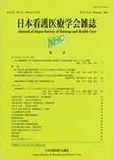Japanese
English
- 有料閲覧
- Abstract 文献概要
- 参考文献 Reference
- サイト内被引用 Cited by
要旨
【目的】地域在住の自立した高齢女性において、骨折既往と転倒恐怖感がQOLの低下に与える影響について明らかにする。
【方法】地域在住女性131名を24年間追跡し、骨折既往、健康関連QOL、転倒恐怖感について調査を行った。健康関連QOLの指標にはSF36を使用した。131人の対象者のうち82人は追跡調査終了時に生存が確認でき、1990年、2005年、2014年の調査すべて参加し、調査内容に記入漏れがなかったものは61名であった。
【結果】参加者の2005年時点の平均年齢は72.4±9.0歳であり、骨折の既往は41.5%であった。80歳未満の者においては骨折既往があると身体的側面のQOLが有意に低値を示した。さらに2014年時の調査では、転倒恐怖感の強さに応じて9年間の身体機能、全体的健康感、日常役割機能(精神)、身体的側面QOLサマリースコアの変化量も有意に低下した。
【結論】地域在住の自立した高齢女性で80歳未満の者においては、骨折の既往があると有意に身体的側面QOLが低下した。80歳以上の集団では骨折既往より転倒恐怖感がQOL低下に有意に関連した。転倒恐怖感の回避は骨折予防に加え高齢女性のQOLを維持する上で重要である。
Purpose: To clarify whether fracture and fear of falling are associated with decreased quality of life (QOL) among community-dwelling elderly women.
Methods: Community-dwelling elderly Japanese women (n=131) were followed up for 24 years. The subjects were examined for history of fracture, fear of falling, and health-related QOL. Data were collected through interviews by using the 36-item short-form health survey (SF-36) questionnaire, and responses concerning falling were scored in a scale corresponding to three response options (“always,” “sometimes,” and “never”). Of the 131 subjects, 82 were still alive at the end of the follow-up period. Complete responses for both QOL- and concern-related questions at baseline and at the end of the follow-up period were obtained for 61 women.
Result: The mean age of the participants (n=61) at baseline was 72.3±8.5 years. Of the patients, 41.5% reported a history of fracture during the follow-up period. Fear of falling was “always” present in 16 women (26.2%), “sometimes” present in 28 women (45.9%), and “never” present in 17 women (27.9%). Women with fall-related concerns at baseline showed significantly weaker grip strength and more frequent history of fracture, diabetes, and hypertension than those without such concerns. In the comparison of SF-36 subscale scores between 2005 and 2014, no significant differences in vitality (VT), social functioning (SF), and bodily pain (BP) scores were observed, whereas a significant decrease was observed in the other subscales. Women with a history of fracture had a significantly lower score in the role-physical (RP) subscale at follow-up than those without a history of fracture. No significant differences in any of the other SF-36 subscales were observed between these subjects. Meanwhile, women with fall-related concerns showed markedly lower scores in physical function (PF), RP, BP, general health, and role-emotional scales at follow-up than those without fall-related concerns, whereas no significant differences were observed in any of these items at baseline.
Conclusion: Decreased health-related QOL was significantly associated with fear of falling rather than with history of fractures. Fall prevention seems to be important not only in preventing fractures but also in maintaining QOL in elderly women.
Copyright © 2015, Japan Society of Nursing and Health Care All rights reserved.


